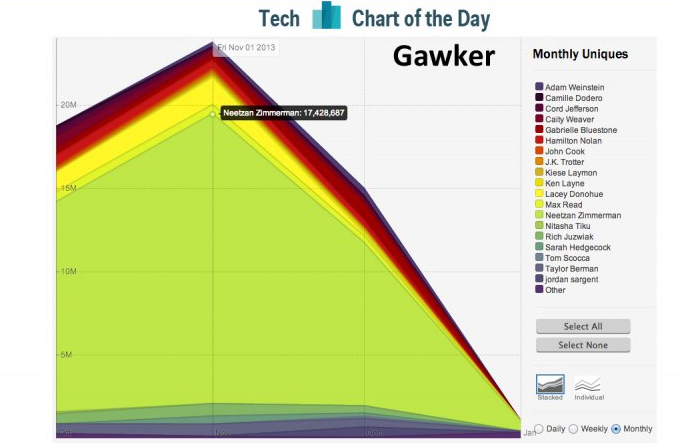The downside of measuring everything
KD had a great post on HR Capitalist about the (potential) link between pay and performance at Gawker media, as evidenced by the below chart that showed that one writer, Neetzan Zimmerman, (his traffic is in light green on the chart) on the staff of 15 or 16 was responsible for 99% of the site's overall traffic, (and revenue, or at least the opportunity to earn revenue).

KD, rightly, concluded that this situation likely presented Gawker a huge and obvious 'Pay for Performance' situation, where if Gawker were truly taking the capitalist/meritocratist approach to business and talent management, they would have dropped about a third of the staff, allocated all that salary budget to Zimmerman, and told the remaining nine or so staff to shut up, (while showing them the traffic chart), if they didn't like being paid about 20% of what Zimmerman was getting.
While we don't know what Gawker actually did, we do know that Zimmerman left to chase something else, so at least it seems on the surface a gigantic rise in salary or performance related comp was not on offer.
But rather than talk about what Gawker should have done, (or do in the future with their comp/performance strategy), I'd rather think a little about a world where having the access to data and the analytical tools to actually do more data-informed performance becomes more and more prevalent.
One of the most common reasons true pay for performance isn't done, or isn't done successfully, is that it just is really hard to accurately and fairly quantify and measure performance in the first place. Unlike the staff of writers at Gawker, who can be reasonably and pretty fairly judged on their performance by web traffic to the site for their articles, which is both easy to measure and not subject to the whims of any manager's opinion or rating biases, most of the rest of us have jobs perhaps a little more complex, variable, and nuanced.
The kinds of jobs that don't allow easy and clean measurement, and consequently don't facilitate easy comparison of workers within and across work groups. So we invent things like competency models, and core job functions, and 360s, and talent reviews and calibration in order to come up with some kind of repeatable, reasonable, and defensible method to rate and review folks. And after all that the difference between the annual salary increases for the 'best' performers and the average performers might be a percent or two.
But going forward driven by the amazing technological advances that are on the horizon we will live in a new world of increased connectivity, improved capability to capture data about the effectiveness of previously untraceable things from a new and improved set of wearable devices, company-issued apps or smartphones that will both broadcast and track our every move, and the nascent internet of things that will provide data on our interactions with machines, (and how fast and effectively we respond to their needs).
Yep, in the (near enough) future almost all kinds of jobs and the relative performance of the people doing those jobs will be measurable. We will be able to measure everyone. Everything that they do. All the time.
Man that will be great.
<You had better get back to work now. Trust me.>

 Steve
Steve